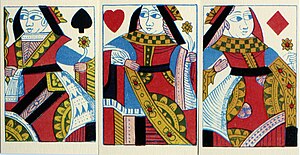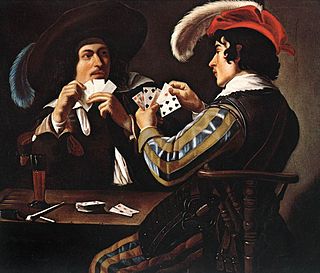
A card game is any game using playing cards as the primary device with which the game is played, be they traditional or game-specific. Countless card games exist, including families of related games. A small number of card games played with traditional decks have formally standardized rules with international tournaments being held, but most are folk games whose rules may vary by region, culture, location or from circle to circle.

Poker is a family of comparing card games in which players wager over which hand is best according to that specific game's rules. It is played worldwide, but in some places the rules may vary. While the earliest known form of the game was played with just 20 cards, today it is usually played with a standard deck, although in countries where short packs are common, it may be played with 32, 40 or 48 cards. Thus poker games vary in deck configuration, the number of cards in play, the number dealt face up or face down, and the number shared by all players, but all have rules that involve one or more rounds of betting.
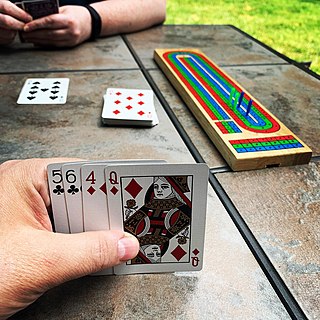
Cribbage, or crib, is a card game, traditionally for two players, that involves playing and grouping cards in combinations which gain points. It can be adapted for three or four players.

Brag is an 18th century British card game, and the British national representative of the vying or "bluffing" family of gambling games. It is a descendant of the Elizabethan game of Primero and one of the several ancestors to poker, the modern version just varying in betting style and hand rankings. It has been described as the "longest-standing British representative of the Poker family."

Thirty-one or Trente et un is a gambling card game played by two to seven people, where players attempt to assemble a hand which totals 31. Such a goal has formed the whole or part of various games like Commerce, Cribbage, Trentuno, and Wit and Reason since the 15th century. 31 is popular in America and Britain.
Ruff and Honours, Ruffe and Trump or Slamm was an English trick-taking card game that was popular in the 16th and 17th centuries; it was superseded in the 18th century by Whist.

Post and Pair or Post and Pare is a gambling card game that was popular in England in the 16th and 17th centuries — another name of the game was Pink. It is based on the same three-card combinations, namely prial, found in related games of this family.

Napoleon or Nap is a straightforward trick-taking game in which players receive five cards each and whoever bids the highest number of tricks chooses trumps and tries to win at least that number of tricks. It is often described as a simplified version of Euchre, although David Parlett believes it is more like "an elaboration of Rams". It has many variations throughout Northern Europe, such as Fipsen. The game has been popular in England for many years, and has given the language a slang expression, "to go nap", meaning to take five of anything. It may be less popular now than it was, but it is still played in some parts of southern England and in Strathclyde. Despite its title and allusions, it is not recorded before the last third of the nineteenth century, and may have been first named after Napoleon III.
Guts is a comparing card game, or family of card games, related to poker. Guts is a gambling game involving a series of deals of 2, 3, or 4 cards. Hand are ranked similarly to hands in poker. The betting during each deal is simple : all players decide whether they are "in" or "out", and announce this at the same time. Each deal has its own showdown, after which the losers match or increase the pot, which grows rapidly. A round of the game ends when only one person stays in and wins the pot.
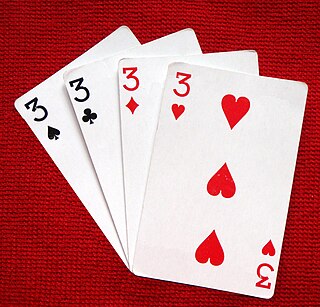
Put, occasionally Putt, is an English tavern game first recorded in the 16th century and later castigated by 17th century moralists as one of ill repute. It belongs to a very ancient family of trick-taking card games and bears close similarities a group known as Truc, Trut,Truque, also Tru, and the South American game Truco. Its more elaborate cousin is the Catelan and Spanish game of Truc, which is still much played in many parts of Southern France and Spain.
The following is a glossary of poker terms used in the card game of poker. It supplements the glossary of card game terms. Besides the terms listed here, there are thousands of common and uncommon poker slang terms. This is not intended to be a formal dictionary; precise usage details and multiple closely related senses are omitted here in favor of concise treatment of the basics.
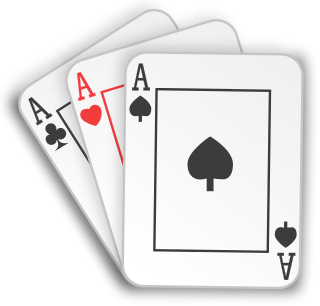
Stop the Bus is a simple game, common in England where it is also known as Bastard.

Julepe, , is a gambling card game of Spanish origin, similar to the English five-card Loo, and best for six players. It spread rapidly across the Spanish-American countries during the 19th century.

The following is a glossary of terms used in card games. Besides the terms listed here, there are thousands of common and uncommon slang terms. Terms in this glossary should not be game-specific, but apply to a wide range of card games played with non-proprietary packs. It should not include terms solely related to casino or banking games. For glossaries that relate primarily to one game or family of similar games, see Game-specific glossaries.
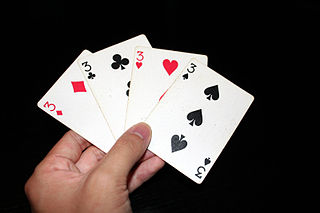
Kemps is a matching card game for two to six teams of two players each, where each player must secretly communicate to their partner when they have four matching cards in their hand. The game is a "cross between Commerce and Authors" with the unusual feature of partnership play. This "party classic" is also known as Canes, Cash and Kent. It appears to be a 21st century game played in America, France and Switzerland (known there as Gemsch or Gämsch, but its origin is unclear.
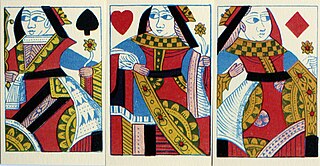
Gleek is an English card game for three people. It is played with a 44-card pack and was popular from the 16th century through the 18th century.

My ship sails, also called my bird sings, is an English card game for children that is played with a 52-card French-suited pack in which the aim is to collect a hand of cards in one suit.
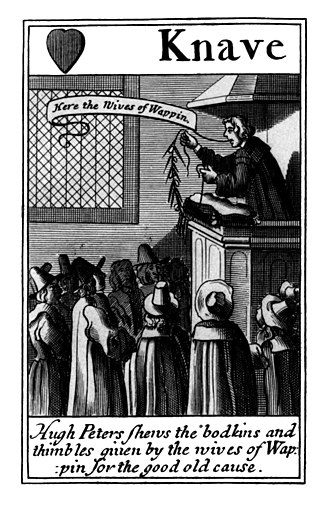
Costly Colours, sometimes just called Costly, is an historical English card game for two players and a "fascinating relative of cribbage". The game "requires a moderate amount of skill in playing, and is well adapted to teach quickness in counting". It has more combinations than cribbage and retains the original scoring system for points, but does not use a 'crib'. In the 19th century it was described as "peculiar to Shropshire."

Culbas or Cul-bas is an historical French card game of the fishing type for three to eight players that dates to at least the 17th century. It is described as being "very old" and having "a great simplicity in which chance plays the biggest role."

Papillon is an old French card game of the fishing type for three or four players. It has been described as "perfect for children who know how to count".
